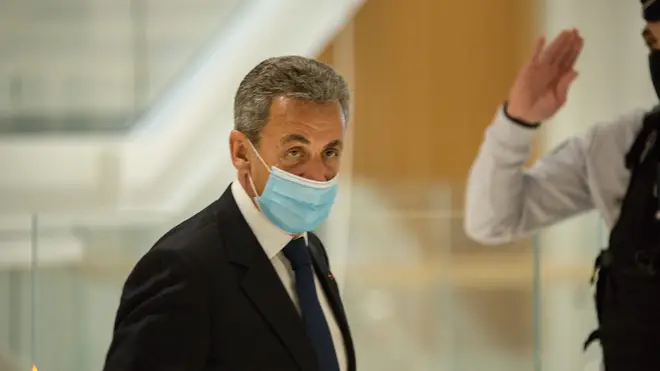
James O'Brien 10am - 1pm
1 March 2021, 14:17 | Updated: 2 March 2021, 13:41

Nicolas Sarkozy has been sentenced to three years in jail, two of them suspended, for corruption and influence peddling.
Sarkozy was found guilty of offering magistrate Gilbert Azibert a prestigious job in Monaco in return for information about a criminal inquiry centred on the former French president.
The 66-year-old's lawyer Thierry Herzog, 65, and Azibert, 74, received the same sentences.
Sarkozy, who was president from 2007 to 2012, can serve his term under house arrest with an electronic tag.
He is expected to appeal.
He firmly denied all the allegations against him during the 10-day trial that took place at the end of last year.
It was the first time in France's modern history that a former president had gone on trial for corruption.
Sarkozy's predecessor, Jacques Chirac, was found guilty in 2011 of misuse of public money and given a two-year suspended prison sentence for actions during his time as Paris mayor.
Prosecutors had requested two years of prison and a two-year suspended sentence for the three defendants over what they said was a "corruption pact".
The trial focused on phone conversations that took place in February 2014.
At the time, investigative judges had launched an inquiry into the financing of the 2007 presidential campaign.
During the investigation, they discovered Sarkozy and Herzog were communicating via secret mobile phones registered to the alias "Paul Bismuth".
Conversations wiretapped on these phones led prosecutors to suspect Sarkozy and Herzog of promising Azibert a job in Monaco in exchange for information about a separate legal case, in which Sarkozy was accused of accepting illegal payments from L'Oreal heiress Liliane Bettencourt for the 2007 campaign.
Azibert never got the Monaco job but prosecutors concluded the "clearly stated promise" constituted in itself a corruption offence under French law, even if the promise was not fulfilled.
Sarkozy told the court his political life was all about "giving (people) a little help. That all it is, a little help".
"I was 100 billion miles away from thinking we were doing something we did not have the right to do," he said.
He said he did not get confidential information from Azibert.
Sarkozy withdrew from active politics after failing to be chosen as his conservative party's presidential candidate for France's 2017 election, which was won by Emmanuel Macron.
He still remains very popular amid right-wing voters and plays a major role behind the scenes, including through maintaining a relationship with Mr Macron, whom he is said to advise on certain topics.
He will face another trial later this month along with 13 other people on charges of illegal financing of his 2012 presidential campaign.
His conservative party is suspected of having spent 42.8 million euro (£36.3 million) - almost twice the maximum authorised amount - to finance the campaign, which ended in victory for Socialist rival Francois Hollande.
In another investigation opened in 2013, Sarkozy is accused of having taken millions from then-Libyan dictator Muammar Gadhafi to illegally finance his 2007 campaign.
He was handed preliminary charges of passive corruption, illegal campaign financing, concealment of stolen assets from Libya and criminal association. He has denied wrongdoing.